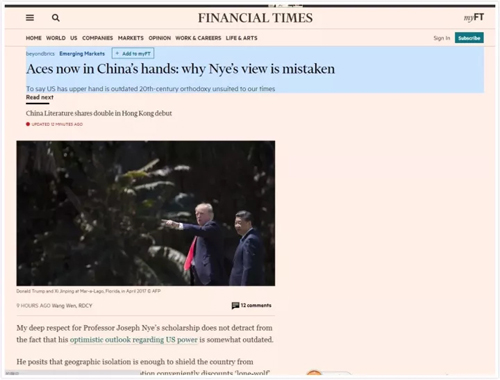发布时间:2017-11-08 作者: 王文
约瑟夫·奈教授最近对于美国权力的乐观估计实在是显得有些过时。他认为,地理上的隔绝足以保护美国不受外来敌对势力的攻击,然而这个假设在学理上略显轻率。“独狼式”恐怖袭击事件在美国频繁发生,带来了相对于传统地缘政治冲突更加严重的伤亡与破坏。另外,美国目前确实不需要更多的石油进口,但这却使得中国在中东、俄罗斯、非洲和拉美的能源市场上受到更加热烈的欢迎。、中国日益代替美国,成为世界自由贸易的代言人。此外,人民币的国际接纳程度不断提升,对美元的主导地位构成了长远意义上的挑战。
编者按:美国哈佛大学教授约瑟夫·奈11月2日在英国《金融时报》上发表文章《在与中国的竞争中,“王牌”在美国手中》(America still holds the aces in its poker game with China),认为美国在与中国的竞赛中还有四张王牌,并且这几张牌应该足以持续到特朗普任期结束后的更长时间。中国人民大学重阳金融研究院执行院长、教授王文11月8日在英国《金融时报》上发表辩论文章,题目是《“王牌”在中国手中,为何约瑟夫·奈是错误的》。两篇文章的中文版均由中国人民大学重阳金融研究院学术合作部实习生傅成昱翻译。@人大重阳 官网与微信公众号(ID:rdcy2013)与读者一起来分享这两篇文章。
“王牌”在中国手中,为何约瑟夫·奈是错误的
作者:王文
我对于约瑟夫·奈教授的深厚学识抱有崇高的敬意。然而,从学术批评的角度来说,他最近对于美国权力的乐观估计实在是显得有些过时。他认为,地理上的隔绝足以保护美国不受外来敌对势力的攻击,然而这个假设在学理上略显轻率。“独狼式”恐怖袭击事件在美国频繁发生,带来了相对于传统地缘政治冲突更加严重的伤亡与破坏,这一点奈教授并未有足够考虑。另外,美国目前确实不需要更多的石油进口,但这却使得中国在中东、俄罗斯、非洲和拉美的能源市场上受到更加热烈的欢迎。尽管美国更可能承受的起贸易战的损失,中国却日益代替美国,成为世界自由贸易的代言人。此外,随着跨境支付的发展,人民币的国际接纳程度不断提升,对美元的主导地位构成了长远意义上的挑战。

总而言之,中美之间相对实力和国际地位的接近程度在历史上绝无仅有。故而,对两国而言,重拾“不冲突、不对抗,相互尊重,合作共赢”的新型大国关系原则将会是未来双边关系发展的理性选择和重要方向。
附英文文章:Aces now in China’s hands: why Nye’s view is mistaken
My deep respect for Professor Joseph Nye’s scholarship does not detract from the fact that his optimistic outlook regarding US power is somewhat outdated.
He posits that geographic isolation is enough to shield the country from hostile powers. Yet this blithe assumption conveniently discounts `lone-wolf’ terrorist attacks, capable of visiting far greater destruction than traditional geopolitical animus.
While the US is now emancipated from fuel imports, it is precisely this need which has seen China welcomed with open arms on energy markets in the Middle East, Russia, Africa and Latin America.
While the US might fare better in a trade war, it is China that flies high the banner of global free trade. The greenback’s primacy is confronted with increasing acceptance of the renminbi as a result of cross-border payment.
Built on the four elements of geography, energy, trade and currency, Professor Nye’s assertion that “America still holds the aces in its poker game with China” reads decidedly like 20th-century realist orthodoxy, ill-suited to the conditions obtaining in China during President Trump’s visit from November 8 to 10.
The occasion represents Trump’s first state visit to China since he assumed the presidency and the first time that he has set foot on the mainland.
Rumour has it that, many years ago, the maverick businessman got his first taste of Chinese business acumen when he was unable to gain an edge during talks in Hong Kong. The same held true when, in April 2017, he learnt of the wisdom of China’s political leadership during a marathon seven-hour meeting with President Xi Jinping in Florida.
Visits by US presidents have always commanded pride of place on the Chinese diplomatic calendar, with such events accorded the highest of priorities due to the special nature and importance of the Sino-American relationship.
What sets Trump’s upcoming visit apart from those by Bill Clinton, George W Bush and Barack Obama are important changes in the comparative social psychology of the two countries.
China is increasingly confident in dealing with such occasions. In recent years, its ability to shape the future of Sino-American relations has caught up with and even exceeded that of the US on such issues as human rights, trade and the Taiwan strait, where the US is deliberately obstructive.
This new-found sense of self is to be seen, first and foremost, in fundamental strategic judgments regarding the stability of the Sino-US binary. Thus far, the two countries have established mature mechanisms for bilateral co-operation in many fields, underscored by over 100 channels for dialogue, almost $600bn in bilateral trade, and personnel exchange annually amounting to 6m.
Although the Thucydides trap still haunts bilateral relations between the two countries, systematic and structural factors have determined that the future will be marked by coexistence between competition and co-operation. This sense of general stability will not be changed, for better or worse, by a single presidential visit.
Second, the way both countries are perceived by international society has undergone a subtle shift. China has enjoyed broad support for its championship of such just causes as infrastructure construction, climate change, free trade, reforming the international order, poverty reduction and supporting UN endeavours. In its capacity as the world’s largest trade nation, the second-largest economy and third largest military power, China has exercised positive international influence in such multilateral realms as G20, Belt and Road Initiative and Brics.
This contrasts starkly with US post-election withdrawal from global affairs. The steady decline in US soft power is both bemoaned and critiqued by politicians, scholars and members of civil society alike.
Third, China is ever committed to its mission of blazing a path of socialism with Chinese characteristics. In contrast with the internecine conflict rending Western society, China’s increasing ability to impose orderly governance is a beacon of hope for the developing world.
Rebuffed by Trump, who is facing mounting criticism over his leadership both at home and abroad, traditional US allies such as France, Germany, Australia, Japan and the UK have heaped praise upon China and President Xi Jinping.
Embroiled in domestic political strife, Trump’s visit is underscored by a marked thirst for Chinese support in all areas. A businessman by trade, Trump’s realist outlook has lent itself to a refutation of `political correctness’ and a focus on the end result. This resonates with China’s founding principles of seeking truth from facts,innovation and self-reliance.
Given this convergence, there is much scope for building a `win-win’ relationship in such areas as energy, infrastructure, space, the internet, productive capacity and industrialisation.
In sum, relative Sino-US power and international status has reached unprecedented levels. Going forward, the binary will be informed by the new governing principles in big-power relations, namely `no conflict, no confrontation, mutual respect, and win-win co-operation’.